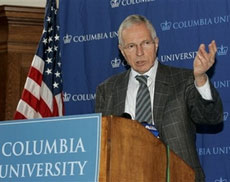 |
| Edmund S. Phelps, Nobel Economics Prize winner, answers questions during a press conference at Columbia University in New York where he teaches and works on his research Monday, Oct. 9, 2006 (AP Photo/David Karp) ] |
American Edmund S. Phelps won the 2006 Nobel Memorial Prize in Economic Sciences on Monday for furthering the understanding of thetrade-offsbetween inflation and its effects on unemployment.
The 73-year-old Columbia University professor's work showed how low inflation today leads to expectations of low inflation in the future, thereby influencing future policy decision making by corporate and government leaders.
Phelps is the sixth American to win a Nobel this year, meaning that every prize except for the literature and peace awards, which are yet to be announced, have gone to Americans.
"I tried to put the people back into our economic model and in particular to take into account their expectations about what other economic actors are doing at the same time and in the future," he said.
Phelps challenged the prevailing view in the 1960s that there was a stable, negative relationship between inflation and unemployment, illustrated by the so-called Phillips curve.
"He recognized that inflation does not only depend on unemployment, but also on the expectations of firms and employees about price and wage increases," the academy said.
Phelps put together a new model to describe the relationship between inflation and unemployment, known as theexpectations-augmented Phillips curve.
He also showed that there is a precise "equilibrium unemployment rate" at which firms raise workers' wages at the same rate as average wages are expected to rise in the economy overall. Those findings have influenced central banks in their interest-rate decisions, the academy said.
"Phelps' work has fundamentally altered our views on how the macroeconomy operates," the citation said, adding his work proved fruitful in understanding the causes of the increases in both inflation and unemployment in the 1970s.
In its citation announcing the award, the academy said that Phelps had advanced the understanding of the trade-offs between full employment, stable pricing and rapid growth, all of which are the central goals of any sound economic policy.
(Agencies)
|